|
|
|
Sort Order |
|
|
|
Items / Page
|
|
|
|
|
|
|
| Srl | Item |
| 1 |
ID:
132353
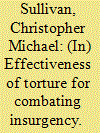

|
|
|
|
|
| Publication |
2014.
|
| Summary/Abstract |
It is commonly believed that torture is an effective tool for combating an insurgent threat. Yet while torture is practiced in nearly all counterinsurgency campaigns, the evidence documenting torture's effects remains severely limited. This study provides the first micro-level statistical analysis of torture's relation to subsequent killings committed by insurgent and counterinsurgent forces. The theoretical arguments contend that torture is ineffective for reducing killings perpetrated by insurgents both because it fails to reduce insurgent capacities for violence and because it can increase the incentives for insurgents to commit future killings. The theory also links torture to other forms of state violence. Specifically, engaging in torture is expected to be associated with increased killings perpetrated by counterinsurgents. Monthly municipal-level data on political violence are used to analyze torture committed by counterinsurgents during the Guatemalan civil war (1977-94). Using a matched-sample, difference-in-difference identification strategy and data compiled from 22 different press and NGO sources as well as thousands of interviews, the study estimates how torture is related to short-term changes in killings perpetrated by both insurgents and counterinsurgents. Killings by counterinsurgents are shown to increase significantly following torture. However, torture appears to have no robust correlation with subsequent killings by insurgents. Based on this evidence the study concludes that torture is ineffective for reducing insurgent perpetrated killings.
|
|
|
|
|
|
|
|
|
|
|
|
|
|
|
|
| 2 |
ID:
196678


|
|
|
|
|
| Summary/Abstract |
This article provides theoretical and contextual background to The Academic Question of Palestine. Building on the work of Edward Said, we maintain that Palestine constitutes a unique question with special status in international academic spaces, particularly in the West, because of its entanglement with other imperial and settler colonial forms of dispossession. We argue that the special place that Zionism and its defence has occupied for decades in academia has rendered Palestine one of the thorniest and most divisive issues of our time. In the new millennium, the birth of the BDS movement; the emergence of new solidarities with global anti-racist movements; the scholarly and human rights consensus that Israel constitutes a regime settler colonial apartheid; the acceleration of Zionist violence, until the Gaza genocide, have generated new forms of repression and resistance in the academic space. This Special Issue offers the tools for understanding these recent transformations of the question of Palestine.
|
|
|
|
|
|
|
|
|
|
|
|
|
|
|
|
| 3 |
ID:
181860
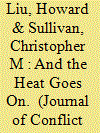

|
|
|
|
|
| Summary/Abstract |
Among security institutions, police occupy a unique position. In addition to specializing in the repression of dissent, police monitor society and enforce order. Yet within research studying state repression, how police institutions are used and deployed to control domestic threats remain under-explored, particularly as it relates to the dual functionality just described. In this study, we develop and test an explanation of police repression accounting for the bifurcation of Mann’s two modalities of state power: infrastructural power and despotic power. Infrastructural power allocates police resources to surveil dissidents and preemptively limit dissent’s emergence or escalation. Police deploy despotic power through repressive responses to political threats. Empirically, we employ unique data to investigate police repression and the modalities of power in Guatemala. To analyze how shifting the balance between infrastructural and despotic power affects police repression, we isolate damage occurring from an earthquake that exogenously reshaped the landscape of infrastructural power. Results affirm the role of infrastructural power in regulating the despotic power of the state. Where local infrastructure was most affected by the earthquake, the security apparatus lost the capacity to surveil nascent movements and predict their activity, thereby providing opportunity for dissidents to mobilize and forcing police to (over-)react rather than shutdown resistance preemptively. However, the intensity of state violence recedes as the state recovers from the infrastructural damage and regains its control of local district.
|
|
|
|
|
|
|
|
|
|
|
|
|
|
|
|
| 4 |
ID:
160621
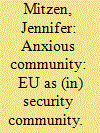

|
|
|
|
|
| Summary/Abstract |
From the Eurocrisis to the migration crisis, and from Brexit to a strengthening far right, the European Union (EU) faces multiple stressors. But while crises unleash anxiety, they do not necessarily portend the worst: because they disrupt old routines, crises can open space for new political possibilities. As a self-consciously hybrid, ‘post-national’ political form, the EU would seem poised to take advantage. Instead it is stuck. In this paper, taking an ontological security approach and focusing on EU migration governance, I propose that one cause of paralysis could lie – ironically – in an aspect of the EU that is crucial to its normative power: Europe’s long peace. An ontological security perspective highlights the management of existential anxiety as crucial to identity, suggesting how different modes of anxiety management have different political effects. Applied here, EU narratives and routines preserving ‘no war’ might suppress relations of structural power; they might mimic primitive defense mechanisms; or they might be symptoms pointing to unconscious processes keeping difficult knowledge – including colonial pasts – undealt with. I suggest how migration governance might manifest these mechanisms, contributing to the difficulties of desecuritising migration and linking its governance to EU values and institutions.
|
|
|
|
|
|
|
|
|
|
|
|
|
|
|
|
| 5 |
ID:
171009
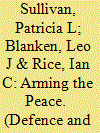

|
|
|
|
|
| Summary/Abstract |
What are the effects of foreign security assistance on the quality of the peace in post-conflict countries? Despite the stakes, and the tremendous amount of weaponry and other forms of foreign military aid flowing to governments of post-conflict countries, the academic literature provides little guidance as to what effects policymakers and practitioners should expect from this type of aid. Military assistance provided to the government of a country emerging from the turmoil of civil war could enable the state to establish a monopoly on the legitimate use of force, leading to a more durable peace and greater human security. However, we contend that significant flows of military aid and weapons from foreign governments may encourage regimes to adopt more repressive approaches to governance. We investigate the impact of security assistance on human rights conditions after 171 internal armed conflicts that ended between 1956 and 2012 using a novel measure of military aid and an instrumented measure of weapons transfers. We find strong evidence that both military aid and arms transfers to post-conflict governments increase state repression.
|
|
|
|
|
|
|
|
|
|
|
|
|
|
|
|
| 6 |
ID:
186592
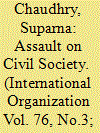

|
|
|
|
|
| Summary/Abstract |
Nongovernmental organizations are central to contemporary global governance, and their numbers and influence have grown dramatically since the middle of the twentieth century. However, in the last three decades more than 130 states have repressed these groups, suggesting that a broad range of states perceive them as costly. When they choose to repress NGOs, under what conditions do states use violent strategies versus administrative means? The choice depends on two main factors: the nature of the threat posed by these groups, and the consequences of cracking down on them. Violent crackdown is useful in the face of immediate domestic threats, such as protests. However, violence may increase the state's criminal liability, reduce its legitimacy, violate human rights treaties, and further intensify mobilization against the regime. Therefore, states are more likely to use administrative crackdown, especially in dealing with long-term threats, such as when NGOs influence electoral politics. I test this theory using an original data set of administrative crackdowns on NGOs, as well as violent crackdown on NGO activists, across all countries from 1990 to 2013. To shed light on the strategic decision between violent or administrative crackdown, and how states may perceive threats from domestic and international NGOs differently, I provide a case study from India. I conclude by discussing the implications of this crackdown for the use of civil society actors by the international community, as well as donors and citizens in the global South.
|
|
|
|
|
|
|
|
|
|
|
|
|
|
|
|
| 7 |
ID:
196680


|
|
|
|
|
| Summary/Abstract |
In general, Palestine solidarity activism—irrespective of how and where it happens—faces censorship and repression, whereby solidarity with Palestine as a (national) cause is stigmatized and considered toxic to any mainstream discussion of the politics of Palestine/Israel. Academia tends to follow this norm of stigmatization and toxification of Palestine solidarity and any recognition of the legitimacy of the Palestinian struggle for liberation is viewed as a violation of the norms of scientific (i.e. objective) knowledge production. More recently, the adoption of the International Holocaust Remembrance Alliance working definition of antisemitism has played a critical role in censuring and censoring individual scholars and scholarship deemed too supportive of the Palestinian struggle. In this article, however, I view this manner of repression as embedded in a political project that extends far beyond the working definition. Specifically, I argue that the academic repression of Palestine solidarity draws on the lasting discursive legacies of the Global War on Terror that sought to bifurcate the world into ‘good’ and ‘evil.’ Drawing on my personal experiences of repression where my work has been charged as being antisemitic, sympathetic to terrorism/terrorists and defending fundamentalism, I argue that lumping Palestinian solidarity with all things evil, abnormal, disruptive, negative, and inappropriate represents a continuation of the Global War on Terror as the Palestinian cause is toxified as nothing more than an extension of the ‘Axis of Evil.’
|
|
|
|
|
|
|
|
|
|
|
|
|
|
|
|
| 8 |
ID:
123611
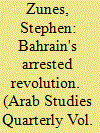

|
|
|
| 9 |
ID:
188647


|
|
|
|
|
| Summary/Abstract |
Even before the Arab Uprising waves, the grievances of increased demands on services and subsidies, shifting economic policy, the deteriorating core-periphery relations between Amman and erstwhile major centers in the Jordanian hinterland (e.g., al-Karak, Maʿān, al-Ṭafilah) have all characterized one aspect of the delicate balance of power in the Hashemite Kingdom. This article will examine the nature of this deterioration, and how the monarchy has variously conceded to, repressed, and thereby withstood repeated protests emanating from the hinterlands. Finally, this article examines a case study of the city of Maʿān as a bellwether hub of popular protest in Jordan.
|
|
|
|
|
|
|
|
|
|
|
|
|
|
|
|
| 10 |
ID:
190905


|
|
|
|
|
| Summary/Abstract |
Transformations in state violence are intimately associated with technological capacity. Like previous era-defining technologies, global digital networks have changed state violence. Offensive cyber capabilities (OCCs) appear to constitute a major technological development that offers the potential for reducing state violence. This article asks: are OCCs really the better angels of our digital nature? Current scholarship in strategic studies, adopting a narrow definition of violence, conceives of OCCs as largely non-violent. This ignores how technology has given rise to new forms of harm to individuals and communities, particularly in the context of violent state repression. We propose using an expanded definition of violence, including affective and community harms, and argue that OCCs relocate, rather than reduce, state violence towards non-bodily harms. Even though their lethal effects are limited, OCCs are not, as is supposed, a non-violent addition to state arsenals. This conclusion has important implications for international affairs, including re-orienting defensive cybersecurity efforts and altering calculations around the perception of OCCs by adversaries.
|
|
|
|
|
|
|
|
|
|
|
|
|
|
|
|
| 11 |
ID:
195130


|
|
|
|
|
| Summary/Abstract |
Many autocrats govern with an in-group, whose support must be secured, and an out-group, which is subject to repression. How do autocrats exploit in-group/out-group dynamics to secure their survival? One strategy, we argue, is to broadcast out-group repression to the in-group as a signal of the regime’s capacity for violence. Empirically, we focus on China, where the government represses ethnic Uyghurs in Xinjiang. Drawing on 1 million articles from six propaganda newspapers, we show that the regime broadcasts out-group repression to urban elites on each anniversary of the 1989 Tiananmen Square massacre, when 10% of Beijing residents joined anti-regime protests. To understand its effects, we conducted a survey experiment balanced on the national census during the June 2020 Tiananmen anniversary. Using a list experiment to mitigate preference falsification, we show that CCP propaganda about Uyghurs during the Tiananmen anniversary discourages protests among politically engaged urban elites because they fear repression.
|
|
|
|
|
|
|
|
|
|
|
|
|
|
|
|
| 12 |
ID:
164958
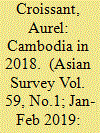

|
|
|
|
|
| Summary/Abstract |
In 2018, ever-incumbent Prime Minister Hun Sen scored a landslide victory in the Cambodian general elections. Three factors in particular explain this outcome. First, the elimination of the main opposition party, whose strategy of a peaceful election boycott failed. Second, favorable economic conditions and government handouts of spoils to constituencies that traditionally supported the opposition. Third, the weak leverage of the United States and the EU, and the Hun Sen regime’s strong links with China.
|
|
|
|
|
|
|
|
|
|
|
|
|
|
|
|
| 13 |
ID:
172469
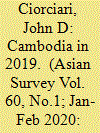

|
|
|
|
|
| Summary/Abstract |
In 2019, Cambodia saw long-ruling Prime Minister Hun Sen tighten his grip on power. Economic growth continued, but with rising risks related to a real estate bubble, mounting debt, and yawning social inequality. Externally, Cambodia deepened its dependency on China, insulating the Hun Sen regime in some respects but contributing to new vulnerabilities.
|
|
|
|
|
|
|
|
|
|
|
|
|
|
|
|
| 14 |
ID:
152296
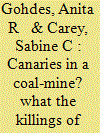

|
|
|
|
|
| Summary/Abstract |
An independent press that is free from government censorship is regarded as instrumental to ensuring human rights protection. Yet governments across the globe often target journalists when their reports seem to offend them or contradict their policies. Can the government’s infringements of the rights of journalists tell us anything about its wider human rights agenda? The killing of a journalist is a sign of deteriorating respect for human rights. If a government orders the killing of a journalist, it is willing to use extreme measures to eliminate the threat posed by the uncontrolled flow of information. If non-state actors murder journalists, it reflects insecurity, which can lead to a backlash by the government, again triggering state-sponsored repression. To test the argument whether the killing of journalists is a precursor to increasing repression, we introduce a new global dataset on killings of journalists between 2002 and 2013 that uses three different sources that track such events across the world. The new data show that mostly local journalists are targeted and that in most cases the perpetrators remain unconfirmed. Particularly in countries with limited repression, human rights conditions are likely to deteriorate in the two years following the killing of a journalist. When journalists are killed, human rights conditions are unlikely to improve where standard models of human rights would expect an improvement. Our research underlines the importance of taking the treatment of journalists seriously, not only because failure to do so endangers their lives and limits our understanding of events on the ground, but also because their physical safety is an important precursor of more repression in the future.
|
|
|
|
|
|
|
|
|
|
|
|
|
|
|
|
| 15 |
ID:
160384
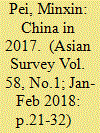

|
|
|
|
|
| Summary/Abstract |
Strongman rule returned to China in 2017 when Xi Jinping secured near-total political dominance. Repression remained intense while the Chinese economy performed reasonably well due to credit support. US–China relations are entering an uncertain phase. Strongman rule is likely to increase the risk of major policy mistakes and deliver few concrete achievements.
|
|
|
|
|
|
|
|
|
|
|
|
|
|
|
|
| 16 |
ID:
142044


|
|
|
|
|
| Summary/Abstract |
Critiques of China’s ‘oil diplomacy’ center on its alleged disregard for transparency and human rights, yet such claims ignore that the problematic relationship between resource extraction and human rights precedes Chinese market entry. This article explores whether human rights implications are more serious for states exporting oil to China compared to another major oil importer, the United States. Contrary to the conventional wisdom, we argue that oil export dependence on the USA affects human rights more negatively than dependence on China because of differences related to the timing of market entry. The United States established stable relationships with oil supplier states decades ago, creating dependencies that are sufficiently long-term for the implications of the resource curse to take hold, and taking place before human rights became part of the US foreign policy agenda. In comparison, China’s late entry into global oil markets in the early 1990s meant that market access often required the provision of generous loan packages, which may help counteract the detrimental effects of oil dependence. Our empirical analysis examines the impact of oil export dependence on China versus the USA on human rights in supplier states for the 1992–2010 period. Results show that oil producing states dependent on exports to the USA exhibit lower human rights performance than those exporting to China. We also demonstrate that lower human rights performance for US exporters stems from long-term trends rather than short-term fluctuations in oil export dependence.
|
|
|
|
|
|
|
|
|
|
|
|
|
|
|
|
| 17 |
ID:
173129
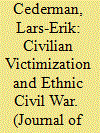

|
|
|
|
|
| Summary/Abstract |
While many studies provide insights into the causes of wartime civilian victimization, we know little about how the targeting of particular segments of the civilian population affects the onset and escalation of armed conflict. Previous research on conflict onset has been largely limited to structural variables, both theoretically and empirically. Moving beyond these static approaches, this article assesses how the state-led targeting of specific ethnic groups affects the likelihood of ethnic conflict onset and the evolution of conflicts once they break out. Relying on a new data set with global coverage that captures the ethnic identity of civilian victims of targeted violence, we find evidence that the state-led civilian victimization of particular ethnic groups increases the likelihood that the latter become involved in ethnic civil war. We also find tentative, yet more nuanced, evidence that ethnic targeting by state forces affects the escalation of ongoing conflicts.
|
|
|
|
|
|
|
|
|
|
|
|
|
|
|
|
| 18 |
ID:
186349
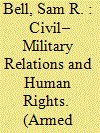

|
|
|
|
|
| Summary/Abstract |
Do civil–military relations influence human rights practices? Building on principal–agent theory, we argue that civilian–military relations, instead of having an effect on mean levels of repression, will be associated with the dispersion in human rights practices. States where there is less control of the military or more conflict between civilian and military leadership will see a wider range of human rights practices. We test our hypotheses quantitatively on a global sample of countries, using updated data on civil–military relations and find evidence that civil–military conflict and lack of control increase the variance in human right practices.
|
|
|
|
|
|
|
|
|
|
|
|
|
|
|
|
| 19 |
ID:
121793
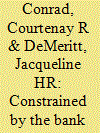

|
|
|
|
|
| Publication |
2013.
|
| Summary/Abstract |
Why does the discovery of oil lead to increased government repression in some countries and not others? Why is there variance in the extent to which democracy constrains state violations of human rights? We assume that an executive's propensity to use violence against citizens is a function of the extent to which he is dependent on his citizenry. Executives can be dependent on their citizenry in two ways: (1) at the bank for financial resources, and (2) at the ballot box for political support. We argue that these considerations jointly influence executive decisions to engage in state repression, and consequently, observed human rights abuse. Using a dataset of 146 countries from 1981 to 2011, we find that democratic institutions have a moderating effect on the positive relationship between unearned revenues and human rights violations. Decreased reliance on citizens for revenue does not weaken and may actually strengthen the pacifying effect of democratic institutions on state terror. Our results suggest that pursuing democracy is a useful way to reduce political violence, both directly and indirectly, even in the presence of a resource curse. Furthermore, the discovery of oil and other unearned revenues is unlikely to undermine the positive relationship between democratic institutions and domestic protections for human rights.
|
|
|
|
|
|
|
|
|
|
|
|
|
|
|
|
| 20 |
ID:
128979


|
|
|
|
|
| Publication |
2014.
|
| Summary/Abstract |
Civil conflict appears to be contagious-scholars have shown that civil wars in a state's neighborhood make citizens more likely to rebel at home. However, war occurs when both rebels and the state engage in conflict. How do state authorities respond to the potential for civil conflict to spread? We argue that elites will anticipate the incentive-altering effects of civil wars abroad and increase repression at home to preempt potential rebellion. Using a Bayesian hierarchical model and spatially weighted conflict measures, we find robust evidence that a state will engage in higher levels of human rights violations as civil war becomes more prevalent in its geographic proximity. We thus find evidence that states violate rights as a function of the internal politics of other states. Further, we argue authorities will act not to mimic their neighbors but rather to avoid their fate.
|
|
|
|
|
|
|
|
|
|
|
|
|
|
|
|
|
|
|
|
|